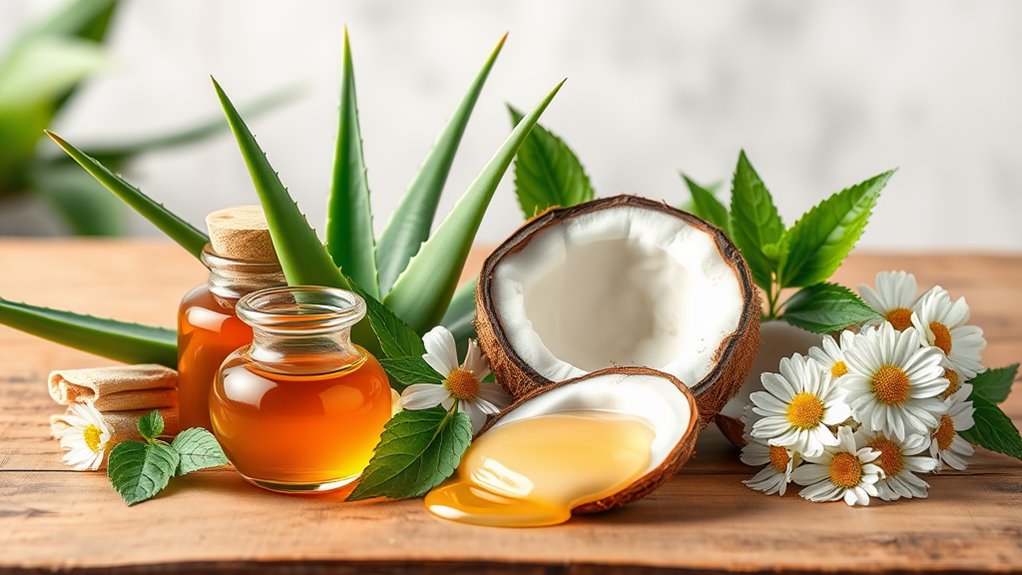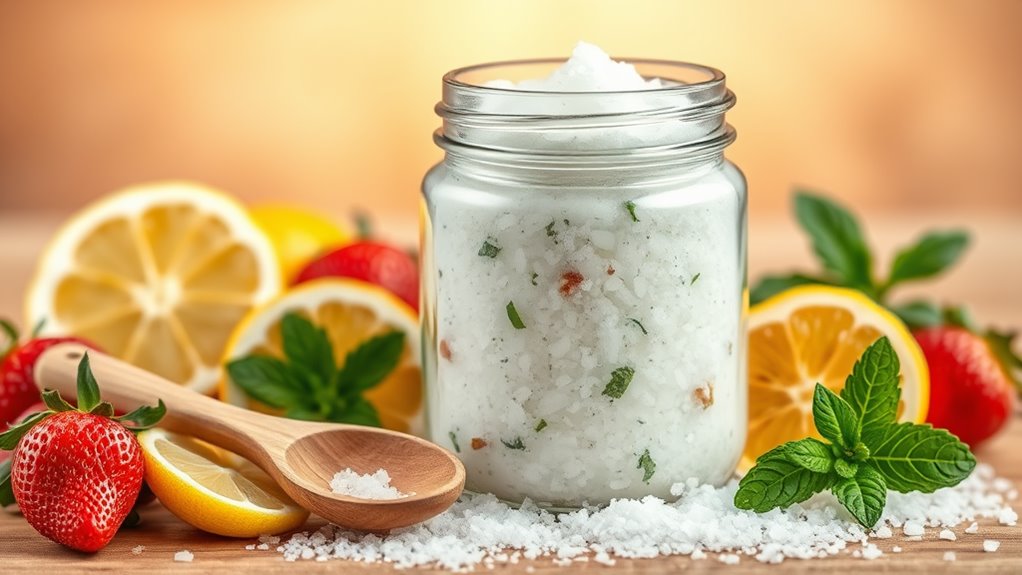Natural Ingredients That Dermatologists Secretly Love
When it comes to skincare, you might be surprised to find that some of the most effective ingredients are natural. Dermatologists often turn to oils and extracts that provide real benefits without harsh chemicals. From soothing aloe vera to the moisturizing properties of jojoba oil, these hidden gems can transform your routine. Curious about what else they recommend? Let’s explore some of these secret favorites and their unique advantages.
Key Takeaways
- Jojoba oil is favored for its non-comedogenic properties, nourishing skin without clogging pores, making it suitable for all skin types.
- Tea tree oil is a dermatologist-approved antiseptic that effectively targets acne-causing bacteria without harsh chemicals.
- Rosehip oil is praised for its ability to boost collagen production and enhance skin elasticity, serving as a natural anti-aging ingredient.
- Aloe vera is beloved for its healing properties, providing hydration and reducing inflammation, ideal for soothing post-sun exposure skin.
- Green tea is recognized for its powerful antioxidants and anti-inflammatory benefits, protecting against UV damage and promoting skin healing.
Aloe Vera: The Soothing Powerhouse
When you think of soothing remedies for your skin, Aloe Vera likely comes to mind. This powerhouse ingredient is revered for its healing properties, making it a staple in any natural ingredients guide.
Rich in vitamins, minerals, and antioxidants, Aloe Vera promotes skin regeneration and hydration. Its anti-inflammatory effects can greatly reduce redness and irritation, especially after sun exposure. Incorporating Aloe Vera into your routine can also help combat common daily habits that accelerate skin aging.
You can easily incorporate Aloe Vera into your skincare routine, whether through gels, creams, or even fresh leaves. By applying it regularly, you’ll notice a marked improvement in skin texture and tone.
Don’t underestimate the power of this humble plant; mastering its use can elevate your skincare game to a whole new level. Embrace Aloe Vera for a naturally radiant complexion.
Jojoba Oil: Nature’s Moisturizer
Jojoba oil is often hailed as nature’s ultimate moisturizer, and for good reason. This liquid wax mirrors your skin’s natural oils, making it an exceptional hydrator.
Here’s why you should embrace jojoba oil in your skincare routine:
-
Non-comedogenic: It won’t clog your pores, reducing the risk of breakouts.
-
Rich in nutrients: Packed with vitamins E and B, it nourishes and heals.
-
Balances oil production: It helps regulate your skin’s sebum levels, perfect for all skin types.
-
Soothes irritation: Its anti-inflammatory properties calm redness and irritation, promoting a smoother complexion.
Incorporating jojoba oil into your regimen can transform your skin, providing lasting hydration and a healthy glow.
It’s a simple yet powerful addition you won’t want to overlook.
Green Tea: Antioxidant Benefits for the Skin
Green tea isn’t just a revitalizing drink; it offers powerful antioxidant benefits for your skin.
Its anti-inflammatory properties can help calm irritation, while its ability to protect against UV damage makes it a must-have in your skincare routine.
Let’s explore how incorporating green tea can enhance your skin health.
Anti-Inflammatory Properties
Three powerful compounds found in green tea—epigallocatechin gallate (EGCG), catechins, and polyphenols—offer remarkable anti-inflammatory benefits for your skin.
These compounds work synergistically to soothe irritation and reduce redness, making green tea an essential ingredient in your skincare routine.
Here’s how green tea can enhance your skin:
-
Calms Inflammation: EGCG reduces swelling and irritation, providing instant relief.
-
Minimizes Redness: Catechins help even out skin tone by calming redness.
-
Fights Acne: Polyphenols can prevent breakouts by reducing inflammation in acne-prone skin.
-
Enhances Healing: These compounds promote faster recovery from skin injuries and irritations.
Incorporate green tea into your regimen for a calmer, healthier complexion.
Your skin will thank you!
UV Protection Benefits
While many people focus solely on sunscreen for UV protection, incorporating green tea into your skincare routine can greatly enhance your defense against harmful rays. Rich in polyphenols, green tea acts as a powerful antioxidant, neutralizing free radicals generated by UV exposure. This helps reduce skin damage and premature aging.
| Benefit | How It Works |
|---|---|
| UV Protection | Neutralizes free radicals |
| Anti-Inflammatory | Reduces redness and irritation |
| Skin Repair | Promotes collagen synthesis |
Adding green tea extract to your moisturizer or using products containing this potent ingredient can amplify your skin’s resilience. By marrying green tea’s benefits with your sunscreen, you’re fortifying your skin’s defenses and promoting a healthier complexion.
Honey: Nature’s Hydrator and Healer
When it comes to natural skincare, honey stands out for its impressive benefits.
You’ll find that its antimicrobial properties help keep your skin clear, while its moisturizing effects keep it hydrated.
Plus, honey’s wound healing capabilities make it a go-to ingredient for soothing irritated skin. Additionally, honey contains scientifically-proven methods that can aid in fading dark spots, enhancing its role in achieving an even skin tone.
Antimicrobial Properties Explained
Although many people recognize honey for its sweetness, its remarkable antimicrobial properties often go unnoticed. Honey’s ability to combat bacteria and promote healing makes it a powerful ally for your skin. Here’s why honey stands out:
-
Hydrogen Peroxide: Honey naturally produces this antibacterial agent, helping to inhibit bacterial growth.
-
Low pH: Its acidic nature creates an inhospitable environment for pathogens.
-
High Sugar Content: This draws moisture out of bacteria, effectively dehydrating and killing them.
-
Antioxidants: Honey is rich in antioxidants, which help reduce inflammation and support skin health.
Incorporating honey into your skincare routine can enhance your defense against harmful microbes while promoting a healthy complexion.
Embrace honey’s benefits and elevate your skincare mastery!
Moisturizing Benefits of Honey
Honey isn’t just a sweet treat; it’s a powerful moisturizer that can transform your skin. Packed with natural humectants, honey draws moisture from the air and binds it to your skin, ensuring hydration throughout the day.
When you apply honey, it penetrates deeply, nourishing your skin and leaving it plump and radiant. Its unique composition helps balance your skin’s moisture levels, making it suitable for all skin types, from oily to dry.
Plus, honey’s soothing properties can calm irritation and enhance your skin’s barrier function. To harness its benefits, consider incorporating honey into your skincare routine, whether as a mask or mixed with your favorite products.
With regular use, you’ll notice a remarkable difference in your skin’s texture and hydration.
Wound Healing Capabilities
While many people know honey for its sweet flavor, its remarkable wound healing capabilities are often overlooked.
Honey’s natural properties can notably aid in the healing process, making it a go-to for dermatologists. Here’s why you should consider incorporating it into your wound care routine:
-
Antimicrobial Properties: Honey fights bacteria, reducing the risk of infection.
-
Moisture Retention: It keeps the wound hydrated, promoting faster healing.
-
Anti-inflammatory Effects: Honey soothes irritation and reduces swelling around the wound.
-
Tissue Regeneration: It encourages new tissue growth, helping to repair damaged skin.
Tea Tree Oil: Natural Antiseptic and Acne Fighter
When you’re on the hunt for a natural solution to fight acne, tea tree oil stands out as a powerful antiseptic. This essential oil, derived from the leaves of the Melaleuca alternifolia tree, contains potent antibacterial and anti-inflammatory properties.
It penetrates deep into the skin, targeting acne-causing bacteria while soothing inflammation. By applying diluted tea tree oil directly to affected areas, you can reduce redness and swelling, promoting clear skin.
Its effectiveness rivals many over-the-counter treatments without harsh chemicals. Just remember to use it sparingly—too much can irritate your skin.
Incorporating tea tree oil into your skincare routine can elevate your approach to acne management, providing you with a natural, effective tool in your quest for mastery over your complexion.
Rosehip Oil: A Boost for Collagen Production
If you’re looking to enhance your skincare routine, rosehip oil is an excellent choice for boosting collagen production. Packed with essential fatty acids and vitamins, it works wonders for skin elasticity and firmness.
Here’s how you can incorporate it effectively:
-
Choose Quality: Opt for organic, cold-pressed rosehip oil for maximum benefits.
-
Patch Test: Always conduct a patch test to avoid any adverse reactions.
-
Apply at Night: Use it as a nightly serum to allow for ideal absorption while you sleep.
-
Layer Wisely: Combine it with hyaluronic acid or a moisturizer for enhanced hydration.
Frequently Asked Questions
Can Natural Ingredients Cause Allergic Reactions in Some Individuals?
Yes, natural ingredients can cause allergic reactions in some individuals. It’s essential to patch-test new products before widespread use. Pay attention to your skin’s response, and consult a dermatologist if you notice any irritation.
How Should I Store These Natural Ingredients for Maximum Effectiveness?
To maximize effectiveness, store your natural ingredients in cool, dark places, away from moisture. Use airtight containers to prevent oxidation, and label them clearly to keep track of expiration dates and specific usage instructions.
Are There Any Side Effects Associated With Using These Natural Ingredients?
Yes, some natural ingredients can cause side effects like irritation or allergic reactions, especially if you’re sensitive. Always patch-test new products on a small skin area to guarantee you won’t experience adverse reactions.
Can I Combine Multiple Natural Ingredients in My Skincare Routine?
You can definitely combine multiple natural ingredients in your skincare routine. Just make sure to patch-test new combinations, and pay attention to how your skin reacts. Balance is key to achieving ideal results without irritation.
How Long Does It Typically Take to See Results From These Ingredients?
You’ll typically see results from natural ingredients within four to six weeks, though it can vary. Stay consistent with your routine, and remember that individual skin types may respond differently to various treatments.
Conclusion
Incorporating these natural ingredients into your skincare routine can transform your complexion. From aloe vera’s soothing properties to the hydrating effects of honey, each offers unique benefits that dermatologists trust. Jojoba oil balances your skin’s oil production, while tea tree oil fights acne effectively. Plus, rosehip oil helps enhance collagen production for improved elasticity. Embrace these dermatologist-approved secrets and watch your skin thrive with nature’s best!





